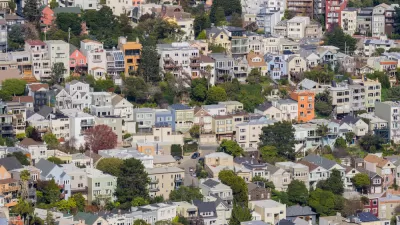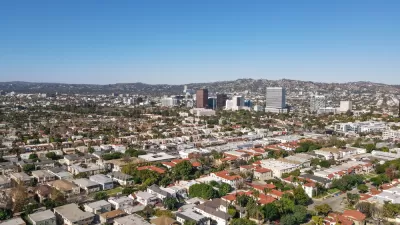The city of Los Angeles in November wrapped up an update to a new Housing Element, as required by state law. A lawsuit will use a different state law to challenge the validity of the city's housing goals.

David Zahniser breaks news of a lawsuit that challenges the city of Los Angeles' recently approved Housing Element of its General Plan, also known as the Plan to House L.A.
The lawsuit comes from a familiar opponent of pro-development planning and development reforms in Los Angeles—the AIDS Healthcare Foundation—wielding a familiar tool, the California Environmental Quality Act.
"The AIDS Healthcare Foundation, a nonprofit group with a history of fighting L.A. planning decisions, is now looking to torpedo the council’s action, saying city officials did not properly assess the environmental impacts of that strategy," reports Zahniser.
Zahniser adds more details: "In a lawsuit filed last month, the nonprofit said the plan would allow officials to 'upzone' much of the city — allowing developers to construct taller, denser buildings — without also requiring 'a corresponding obligation to provide affordable housing.' That, in turn, would create 'more painful displacement of persons, homelessness, and gentrification in the city,' the group said."
Zahniser spoke with a spokesperson for the Los Angeles Department of City Planning and City Attorney Mike Feuer, who both express confidence in the plan despite the charges laid out in the lawsuit.
The Plan to House L.A. sets a goal for the city to add 57,000 new housing units every year until 2029, adding a total of 456,000 housing units over that time. To contribute to that goal, the Plan to House L.A. identified more than 243,000 properties for rezoning, according to Zahniser.
The source article includes a lot more detail about the role of the AIDS Healthcare Foundation in the development politics of the second most populous city in the United States.
FULL STORY: L.A. has a new plan for creating more housing. An AIDS nonprofit wants it thrown out

Maui's Vacation Rental Debate Turns Ugly
Verbal attacks, misinformation campaigns and fistfights plague a high-stakes debate to convert thousands of vacation rentals into long-term housing.

Planetizen Federal Action Tracker
A weekly monitor of how Trump’s orders and actions are impacting planners and planning in America.

San Francisco Suspends Traffic Calming Amidst Record Deaths
Citing “a challenging fiscal landscape,” the city will cease the program on the heels of 42 traffic deaths, including 24 pedestrians.

Defunct Pittsburgh Power Plant to Become Residential Tower
A decommissioned steam heat plant will be redeveloped into almost 100 affordable housing units.

Trump Prompts Restructuring of Transportation Research Board in “Unprecedented Overreach”
The TRB has eliminated more than half of its committees including those focused on climate, equity, and cities.

Amtrak Rolls Out New Orleans to Alabama “Mardi Gras” Train
The new service will operate morning and evening departures between Mobile and New Orleans.
Urban Design for Planners 1: Software Tools
This six-course series explores essential urban design concepts using open source software and equips planners with the tools they need to participate fully in the urban design process.
Planning for Universal Design
Learn the tools for implementing Universal Design in planning regulations.
Heyer Gruel & Associates PA
JM Goldson LLC
Custer County Colorado
City of Camden Redevelopment Agency
City of Astoria
Transportation Research & Education Center (TREC) at Portland State University
Jefferson Parish Government
Camden Redevelopment Agency
City of Claremont





























